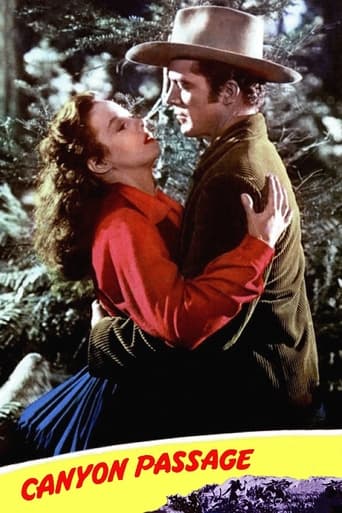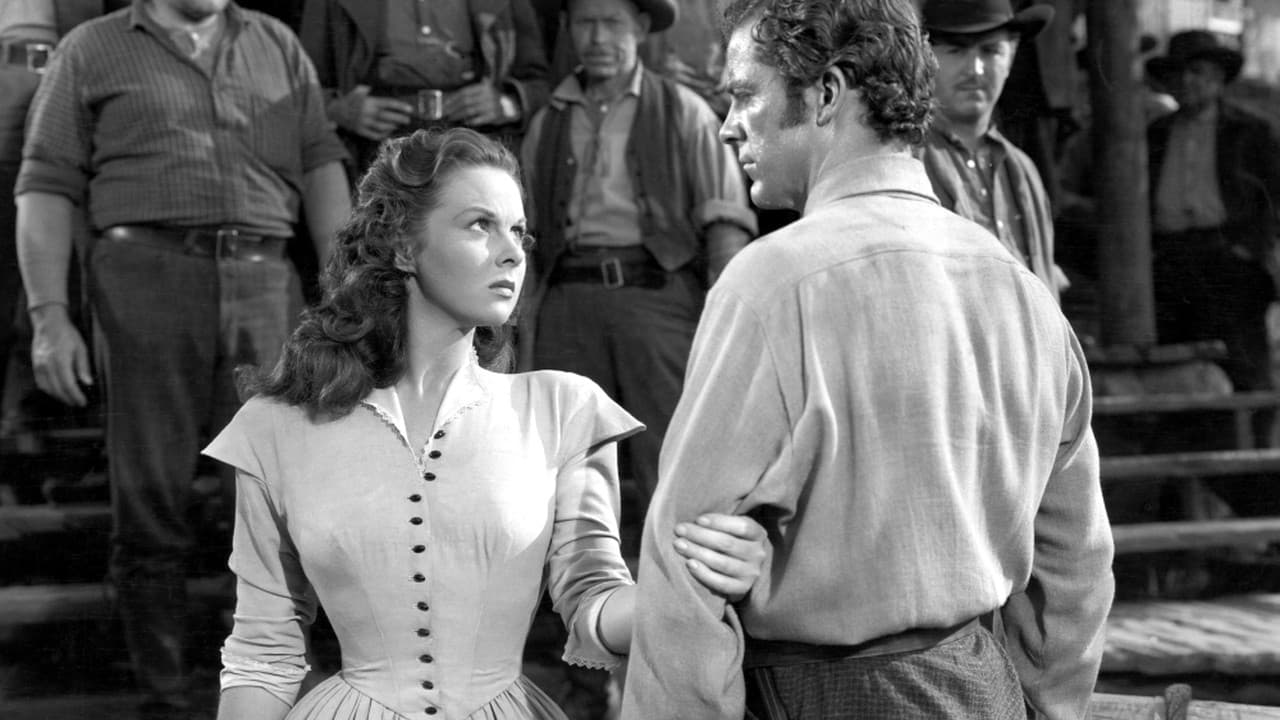jarrodmcdonald-1
Recently I came across a disc of westerns I had where Susan Hayward was the star. She didn't make too many films in this genre, but the ones she did appear in were very sharply filmed. One such early picture was Universal's CANYON PASSAGE, produced by Walter Wanger with whom Hayward was under contract at the time.The story goes that several directors were suggested before European-born director Jacques Tourneur was selected. Tourneur began directing shorts back in his native France in the early 30s, and by the time 1946 rolled around, he had already been in Hollywood for several years. He built a name for himself in the industry directing low-budget horror films for Val Lewton at RKO earlier in the decade, and CANYON PASSAGE would be his first western. More significantly, it would be his first motion picture photographed in Technicolor.During his apprenticeship at RKO, Tourneur learned the importance of morally ambiguous story lines that kept audiences guessing about the fate of a story's main characters. The chance to explore these approaches in Technicolor was probably too good to pass up. He would also have a larger budget at Universal.True to form, Tourneur did not disappoint. He made the most of a frontier tale filmed with exciting outdoor scenes on location in Oregon. He used the impressive lush backdrops of the forests, meadows and mountain ranges off in the distance, juxtaposed with shadowy figures, lurking within the landscape, waiting to ambush others with shocking violence at a moment's notice.In a way the use of vivid Technicolor lulls the audience into accepting the bucolic countryside as something pleasant, beautiful and peaceful. But there is a darker undercurrent in the settling of the west, and its real nature becomes apparent with the use of shadows and with morally ambiguous characterizations that choose not to paint things too stereotypically for the viewer.Indeed, there are no traditional white hats (for the heroes) or black hats (for the villains). Instead, we get group shots, where all the men and women, of varying shades of goodness and corruption, populate the landscape side by side. The final result is a rather complex drama about the community's survival existing across a landscape where men and women make mistakes and are not fully good or bad.It might be said that Tourneur's approach in the western genre paved the way for other morally ambiguous stories to follow. Notably, efforts by Anthony Mann and Raoul Walsh.
secondtake
Canyon Passage (1946)This is a tale with a not so subtle moral message--the man who is modest, just, and hardworking is the better man. And he'll get the sassy girl, the one who is currently attached to the gambling big spender who is the good man's friend and opposite. Dana Andrews plays the virtuous leading man perfectly--he's strong without being a tough or outrageous strong man (like John Wayne) and he's also kind, with a smile the shoots off his sombre face like a flash of light. That's he's popular with women is no surprise, but he's committed most of all to being a successful businessman, and a restless one, roving from outpost to outpost in beautiful Oregon.His counterpart is the likable but flawed Brian Donlevy, who is really the perfect choice here because he isn't the kind of paradigm we will quite fall in love with. The woman who steals the show is Susan Hayward. And then there is Hoagy Carmichael, playing a role he often plays, the musician wise man who sees everything and understands it before anyone else. It's a great group, supported by hundreds of others (yes--an ambitious film) and directed with a subtle, fast touch by the unsung great, Jacques Tourneur.So, in short, "Canyon Passage" was surprise and a total pleasure. I couldn't take my eyes off of the photography and the rich color, good pure Technicolor with the redoubtable Natalie Kalmus coordinating. The plot is strong, and Andrews is terrific in scene after scene. Westerns are sometimes difficult to see from the 21st Century without putting it into some history of film context, but this one works as a drama, pure and simple, a drama set out west in the late 1800s. The movie is also unique in being set in the lush mountains near Portland, Oregon. The scenery is gorgeous in the big sense, but every small scene is lush and forested and rainy--almost the opposite of that dry, open, blue sky norma in a "Western" strictly speaking. Interiors in golden lamplight lead to exteriors of dripping greens and blues, or the delicate grays of night.Even the music is great, especially the lighthearted and clever songs by Carmichael. (The great Frank Skinner handled the rest of the score.) Edward Cronjager is one of the dozen great cinematographers of classic Hollywood, and in this you can see why. It's a complex film, visually, and it never lets up. Especially the night scenes (where the lights and sets could be controlled perfectly) are vivid and have that controlled beauty of great studio (and location) Hollywood. If any of these elements sound good, I wouldn't miss this film.
MartinHafer
There was one reason I decided to watch this film
Dana Andrews. He was a wonderful actor despite being a relatively unknown actor today. His easy-going manner and natural way of acting make him one of my favorites. As it was a western (not even close to my favorite genre), I doubt if I would have watched it otherwise. The film also stars Brian Donlevy and Susan Hayward. Despite Donevy being cast as Andrews' friend, I automatically assumed Donlevy was evil. After all, he often played shifty and larcenous sorts—and rarely anyone heroic. You'll have to watch the film to see if this is again the case. An odd supporting character was played by a mandolin-playing wondering minstrel . Not only was this sort of person odd to see in a western, but it was played by Hoagy Carmichael—a guy you'd usually expect to see playing a piano in a jazz or nightclub. His outfit was a hoot, as he was dressed almost exactly like W.C. Fields in "My Little Chickadee" (or, conversely, the TV pitchman, W. C. Fritos). Also, in a very small role is a young Lloyd Bridges before he became a star.The film finds Andrews escorting Hayward to her fiancé, Donlevy, into the wilderness. However, given the chemistry between Andrews and Hayward, it sure seems as if they are destined to become a couple—even when Andrews becomes engaged to another lady.As for the plot, it's not just another western with the typically clichéd plot. No, it's quite different—and rather hard to explain—suffice to say that most of the usual themes you'd expect in such a film are oddly absent. I liked this, as most westerns are simply variations on one about a half dozen different themes. Good acting, a different story and a gorgeous location shoot in Technicolor make this one worth seeing.By the way, Andrews has a fight with huge Ward Bond in the film. In true leading man fashion, he wins—though in real life, Bond would have destroyed Andrews—as Bond was a burly ex-college football star and outweighed Andrews considerably. Also, at least according to this movie, American-Indian women wore bikinis when they went swimming!By the way, Andy Devine's sons in the film were his actual kids in real life!
ildimo1877
Frequently termed as "psychological", this find of a western, directed by the great Jacques Tourneur less than a year before Out of the Past, is way beyond this kind of terminology. In fact there's no psychology at all, unless you count as such what the spectator compulsively does in need to explain character actions. Tourneur however, not for a moment indulges in narrative superficiality. Instead convolutes a series of deeds, juxtaposes numerous characters, focuses obsessively in directing the glances between the characters (always in medium shots), complexes his camera movements and setups in a way as to convey western dialectics rarely seen before or after. From a presentation of the settler's phase in mid 19th century American west, to a thinly disguised homosexual relationship and from a discussion of frontier justice to an elliptically thoughtful apology on the American Indian issue, Canyon Passage (no canyon in the film
) is the archetypal Western film of actions (but no action, apart from the final Indian attack) defining human character and motive. Tourneur's first (and gloriously shot) colour film.


 AD
AD




